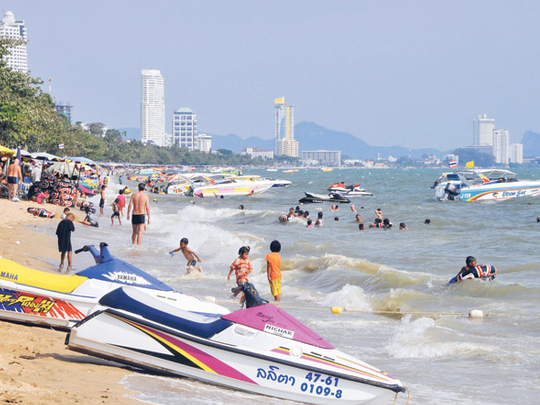
Bangkok: Some hotels in central Bangkok are closing temporarily because of fears of violence between security forces and anti-government protesters who have occupied an upmarket shopping and leisure district since April 3.
At least 25 people died as a result of clashes in another area on April 10.
The unrest threatens to derail a recovery in the $264-billion economy, Southeast Asia's second biggest. Tourism accounts for 6 per cent of GDP and directly employs 1.8 million people out of a population of 67 million.
Comparisons with tourist data last year are tricky.
Tourism was dealt a blow in April 2009 by that year's ‘Songkran riots' involving the same ‘red shirt' group. The sector was only just recovering from a blockade of Bangkok's airports by rival ‘yellow shirts' in late 2008.
At least two hotels in the occupied shopping district have announced they will close temporarily for safety reasons.
"There isn't a guest left in our hotel now," a receptionist at the Holiday Inn Bangkok said. "We are closing from today and plan to reopen on April 26 if the situation improves."
Bookings stopped
InterContinental Hotel Bangkok also announced it would be closing.
"We have stopped taking bookings and have all of our guests checking out by today," a receptionist said.
Both are operated by the Srivikorn family that owns the luxury Gaysorn Plaza shopping mall nearby, which is also closed.
The Four Seasons Hotel, run by Minor International, has stopped taking bookings but is staffing some restaurants.
Centara Grand at CentralWorld, run by Central Plaza Hotel, says its occupancy rate has "dropped to less than 10 per cent from 60 per cent normally".
"We have lost about 4 million baht [453,500] a day since the protests. This doesn't include revenues that should have come from catering services and events," said Ronnachit Mahattanapreut, senior vice-president for finance at the hotel.
"Our occupancy rate now is less than 10 percent but we're still open because we still have guests," he said.
Erawan Group, which owns the five-star Grand Hyatt Erawan, is practically empty. "We basically have no guests since last Friday. Our occupancy now is pretty much zero," group chief exectuvie Kasama Punyagupta said.
The Tourism Authority of Thailand (Tat), a state agency, is sticking to its target of 15.5 million tourist arrivals this year, against 14.1 million last year. It said 4.6 million arrived in the January-March quarter, up from 3.6 million last year.
Other organisations are far more pessimistic.
"There are no new bookings coming in, none," said Anek Srishevachart, president of the Thai-Japan Tourism Association.
"I don't think the TAT's target of 15.5 million tourists this year is going to be possible. It may be even less than 15 million now, all because of this political mess," Anek said on Monday.
AllTheBestTravel said many Japanese tourists had returned home or cancelled trips after the clashes; authorities back home had advised them to go to China, South Korea or Vietnam instead.
The tour operator said it had about 10 per cent of its normal client numbers now, with some Western tourists still coming but heading straight to Phuket or other resorts outside Bangkok.
Surapol Sritrakul, president of the Association of Thai Travel Agents (Atta), said the number of tourists in Thailand for the Songkran New Year festival from April 13 to 15 had slumped.
"Tourist arrivals have been cut in half basically to just 3,000-4,000 per day in April from 6,000-8,000 in the first quarter," Surapol said on Friday.
The Atta expects 14.5 million tourists this year.
Representatives from the Thai Chamber of Commerce, the Thai Bankers' Association, the Federation of Thai Industries and other private sector organisations that met with the government on Monday to expect only between 12 to 13 million tourists.
Mall operators meet
Retailers and mall operators suffering from the 17-day occupation of Rachaprasong shopping district met on Monday to assess the impact of the protests.
"Shops and department stores in the red zone have now lost about 1 billion baht [$31 million] a day," said Thanapol Tangkananan, president of the Thai Retailers' Association.
Central World, the second-largest shopping complex in Southeast Asia, and other big malls remained closed.
The government has forecast 4.5 per cent growth this year. Finance minister Korn Chatikavanij told Reuters that, after all that has happened, he would not be disappointed if that was the outcome.
Business associations that met with the government on Monday forecast growth this year could be cut by 0.3-0.5 percentage point if the protest went on for three months, Puttipong Punnakan, a government spokesman, told reporters.
Amata Corp, Thailand's biggest seller of industrial land and a bellwether for foreign investor sentiment, said some Japanese clients had delayed signing land deals because of the unrest and 2010 sales might suffer.
Consumer confidence fell in March, when the ‘red shirt' rally began. Investment bank Morgan Stanley calculates economic growth this year could be cut by 0.2 percentage point due to the impact on tourism and there would be a bigger hit of up to 0.6 point if consumer confidence slumped further.
Bond yields eased this week as investors bet the central bank would leave interest rates at a record low on Wednesday because the political crisis could hurt the economy.
Turmoil
Thailand's tourism industry may be "decimated" by political tensions, finance minister Korn Chatikavanij said last week. The protests may hurt gross domestic product by as much as 2 per cent, he said in a TV interview. Bowing to pressure by anti-government protesters isn't the way to stability, he said.












